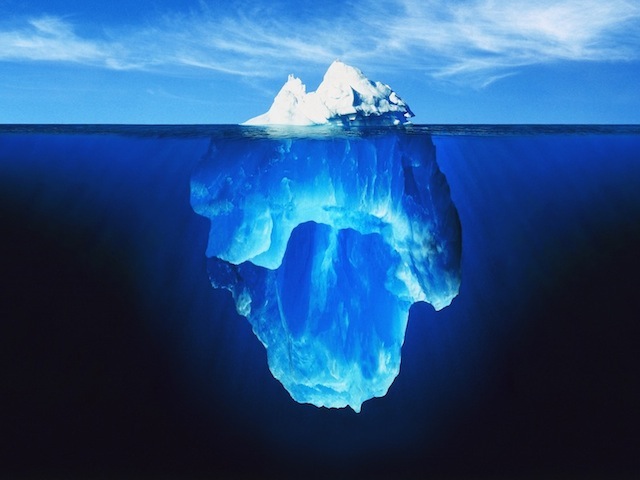For nearly fourteen years I followed Jesus–clueless that my struggles with lust, masturbation, and porn were symptoms of much deeper issue. No wonder I couldn’t “just say no,” ‘bounce my eyes,’ or read my Bible more.
Jesus taught that adultery and sexual immorality come out of the heart (Matt. 15:19). But what does this mean?
In his classic book Inside Out, Larry Crabb compares our inner world to an iceberg. The visible tip of the iceberg represents our behaviors, conscious thoughts, and feelings—things people see and feel. The iceberg mass below the waterline represents those things that cannot be readily identified. These include motives, purposes, and attitudes of the heart, as well as painful memories and hidden emotions.
It doesn’t take much to realize that a person can appear morally obedient, spiritually mature, and emotionally whole, yet below the waterline remain self-centered and immature. It is below the waterline, however, in the place of our inmost being, where the gospel is meant to transform us.
In the waters of our soul, something more deeply rooted must be addressed. But what is it? When Jesus taught that adultery and sexual immorality came out of the heart, He was not giving an anatomy lesson.
In a heated conversation with the religious professionals of the day, Jesus had been discussing what makes a person clean or unclean. The popular teaching was that a person was unclean for not having followed certain ceremonial steps.
But Jesus turned this teaching upside down. “What goes into a man’s mouth does not make him ‘unclean,’” Jesus said, “but what comes out of his mouth, that is what makes him ‘unclean’” (Matt. 15:11).
Jesus’ point was that no matter how many acts of obedience we perform, our problems are internal, not external. Our actions and behavior—what comes out of us—are just the tip of the iceberg.
As if Jesus’ impassioned discussion with the religious rule- keepers were not enough, He went on to utter His harshest words yet, to those who believed that God should be impressed with their moral performances.
“Woe to you, teachers of the law and Pharisees, you hypocrites! You clean the outside of the cup and dish, but inside they are full of greed and self-indulgence. . . . First clean the inside of the cup and dish, and then the outside also will be clean” (Matt. 23:25–26).
What this means for a man caught in the chains of porn and lust is crucial. If you could somehow magically stop looking at porn and exercise self-control in place of lust, you still wouldn’t be dealing with the problem below the waterline.
You’ve only cleaned the outside of the cup and dish.
“The purposes of a person’s heart are deep waters,” wrote Solomon (Proverbs 20:5).
Our hearts hold deep reasons for why we do what we do, which explains why our sinful actions and self-sufficient behaviors can make sense—at least internally.
We are thirsty, but we often move in the wrong directions to satisfy our thirst. “This only have I found,” wrote the author of Ecclesiastes. “God made mankind upright, but men have gone in search of many schemes” (7:29).
Beneath the waterline we are driven by hidden agendas, unconscious goals, and ungodly passions—schemes to slake the thirst that God alone can quench.
Connecting these deep passions and purposes below the water- line to the behaviors, struggles, and issues above the waterline helps us recognize the cause of our confusing behavior.
Understanding ourselves at this level is not about the “what” of our sin (I can’t stop looking), but the “why” of sin (porn promises to meet some legitimate need in me).
Question: If a struggle with porn is the tip of the iceberg, then what might be lurking beneath the surface that contributes to a struggle with porn?
Excerpted and revised from Surfing for God: Discovering the Divine Desire Beneath Sexual Struggle by Michael Cusick. Copyright ©2012. Used by permission of Thomas Nelson, Inc. www.thomasnelsoncorporate.com.
